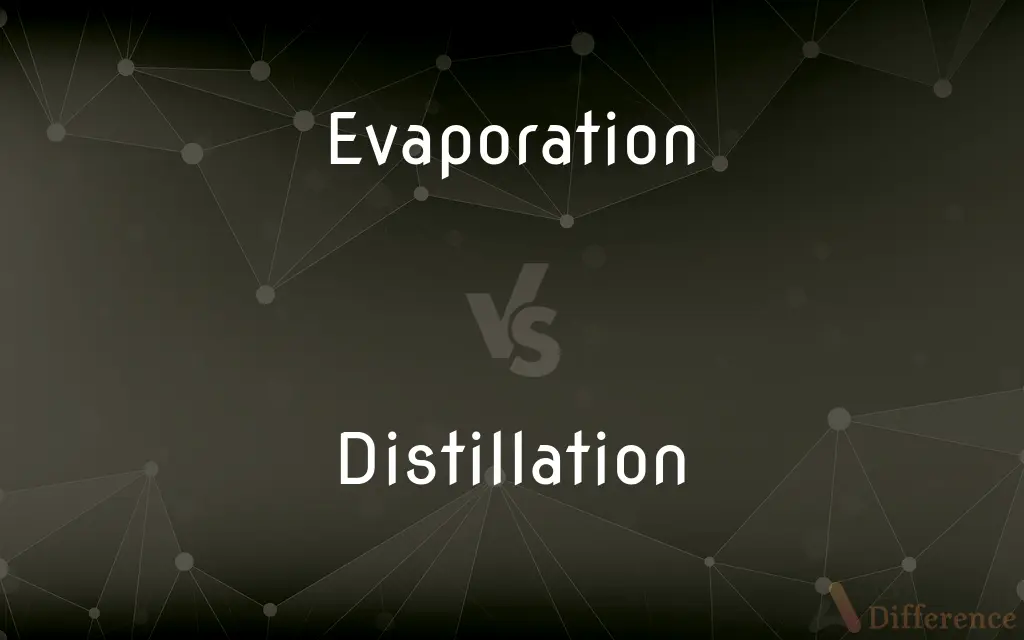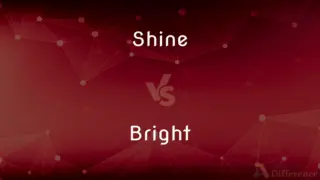Evaporation vs. Distillation — What's the Difference?
By Tayyaba Rehman — Updated on September 22, 2023
Evaporation is the natural process of a liquid turning into vapor, while Distillation is a controlled process that separates substances based on their boiling points.

Difference Between Evaporation and Distillation
Table of Contents
ADVERTISEMENT
Key Differences
Evaporation and Distillation are both processes associated with the conversion of a liquid into vapor, but their purposes and methods differ. Evaporation is a spontaneous process that happens when a liquid changes into vapor due to an increase in temperature or decrease in pressure. In contrast, Distillation is an intentional method used to separate mixtures based on different boiling points.
Taking water as an example, Evaporation occurs when water bodies like lakes or puddles lose their liquid content to the atmosphere over time. This loss is due to the molecules gaining enough energy to convert to vapor. In the realm of Distillation, a mixture, say of alcohol and water, is heated. Since alcohol boils at a lower temperature than water, it will vaporize first and can be collected separately.
A key distinction lies in the fact that Evaporation does not necessarily result in the collection or condensation of the vapor, it might just dissipate into the air. However, Distillation involves a deliberate collection of the vapor, which is then condensed back into a liquid in a separate container.
In essence, while both Evaporation and Distillation involve the conversion of liquid to vapor, Evaporation is a natural, uncontrolled process, and Distillation is a methodical process used to separate and collect components of a mixture.
Comparison Chart
Definition
Natural conversion of liquid to vapor
Controlled process to separate based on boiling points
ADVERTISEMENT
Purpose
Often results from temperature increase
Separate and purify components of a mixture
Collection of Vapor
Not necessarily
Deliberate collection and condensation
Dependency on Boiling Points
Not specific to boiling points
Relies on differing boiling points
Application
Natural phenomena like drying clothes
Purifying liquids, making spirits
Compare with Definitions
Evaporation
A surface phenomenon where molecules escape.
Evaporation of sweat cools the body.
Distillation
Method to purify and refine liquids.
Pure water can be obtained via Distillation.
Evaporation
Spontaneous change due to heat or reduced pressure.
Evaporation is faster on hot summer days.
Distillation
Process to separate substances by boiling points.
Whiskey is produced through Distillation.
Evaporation
Loss of moisture to the atmosphere.
The soil's dryness was attributed to Evaporation.
Distillation
Technique to separate components of a mixture.
Distillation helps in obtaining different fractions from crude oil.
Evaporation
Evaporation is a type of vaporization that occurs on the surface of a liquid as it changes into the gas phase. The surrounding gas must not be saturated with the evaporating substance.
Distillation
Vaporization followed by condensation.
Distillation captures the essence of the original liquid.
Evaporation
The process of turning from liquid into vapour
Snow cover prevents evaporation of water from the soil
Distillation
Controlled heating and cooling to isolate substances.
Perfume is often derived from floral Distillation.
Evaporation
To convert or change into a vapor.
Distillation
Distillation, or classical distillation, is the process of separating the components or substances from a liquid mixture by using selective boiling and condensation. Dry distillation is the heating of solid materials to produce gaseous products (which may condense into liquids or solids).
Evaporation
To draw off in the form of vapor.
Distillation
The evaporation and subsequent collection of a liquid by condensation as a means of purification:the distillation of water.
Evaporation
To draw moisture from, as by heating, leaving only the dry solid portion.
Distillation
The extraction of the volatile components of a mixture by the condensation and collection of the vapors that are produced as the mixture is heated:petroleum distillation.
Evaporation
To deposit (a metal) on a substrate by vacuum sublimation.
Distillation
A distillate.
Evaporation
To change into vapor.
Distillation
The act of falling in drops, or the act of pouring out in drops.
Evaporation
To pass off in or as vapor.
Distillation
That which falls in drops.
Evaporation
To produce vapor.
Distillation
The separation of more volatile parts of a substance from less volatile ones by evaporation and condensation.
Evaporation
To disappear; vanish
Our fears at last evaporated.
Distillation
Purification through repeated or continuous distilling; rectification.
Evaporation
The process of a liquid converting to the gaseous state.
Distillation
(petroleum) Separation into specific hydrocarbon groups; fractionation.
Evaporation
The process in which all or a portion of liquid (in a container) is turned into vapour, in order to increase the concentration of solid matter in the mixture.
Distillation
The substance extracted by distilling.
Evaporation
(archaic) That which is evaporated; vapor.
Distillation
The act of falling in drops, or the act of pouring out in drops.
Evaporation
The process by which any substance is converted from a liquid state into, and carried off in, vapor; as, the evaporation of water, of ether, of camphor.
Distillation
That which falls in drops.
Evaporation
The transformation of a portion of a fluid into vapor, in order to obtain the fixed matter contained in it in a state of greater consistence.
Distillation
The separation of the volatile parts of a substance from the more fixed; specifically, the operation of driving off gas or vapor from volatile liquids or solids, by heat in a retort or still, and the condensation of the products as far as possible by a cool receiver, alembic, or condenser; rectification; vaporization; condensation; as, the distillation of illuminating gas and coal, of alcohol from sour mash, or of boric acid in steam.
Evaporation
That which is evaporated; vapor.
Distillation
The substance extracted by distilling.
Evaporation
See Vaporization.
Distillation
The process of purifying a liquid by boiling it and condensing its vapors
Evaporation
The process of becoming a vapor
Distillation
A purified liquid produced by condensation from a vapor during distilling; the product of distilling
Evaporation
The process of extracting moisture
Evaporation
The process of liquid turning to vapor.
The puddle disappeared due to Evaporation.
Evaporation
Dissipation of liquid without boiling.
The water in the dish underwent Evaporation overnight.
Common Curiosities
Is Evaporation always a slow process?
Generally, yes. Evaporation is usually slower than Distillation which is controlled and rapid.
Why is Distillation used in labs?
Distillation is a method to separate and purify substances, essential in labs. Evaporation is less controlled.
Can Evaporation and Distillation occur together?
Yes, during Distillation, Evaporation happens when the liquid is heated, but the processes have different goals.
Can Evaporation occur at any temperature?
Yes, Evaporation can occur below the boiling point, while Distillation requires heating to specific temperatures.
Is Evaporation only about water?
No, while water is a common example, other liquids can evaporate too. Distillation involves various liquids.
Does Distillation always result in a pure substance?
Not always. Distillation increases purity but might not remove all impurities. Evaporation doesn't aim for purity.
Why don't we use Evaporation to get drinking water?
While Evaporation can produce vapor, Distillation is more efficient and controlled for producing pure water.
Share Your Discovery

Previous Comparison
Shine vs. Bright
Next Comparison
Talmud vs. TorahAuthor Spotlight
Written by
Tayyaba RehmanTayyaba Rehman is a distinguished writer, currently serving as a primary contributor to askdifference.com. As a researcher in semantics and etymology, Tayyaba's passion for the complexity of languages and their distinctions has found a perfect home on the platform. Tayyaba delves into the intricacies of language, distinguishing between commonly confused words and phrases, thereby providing clarity for readers worldwide.














































